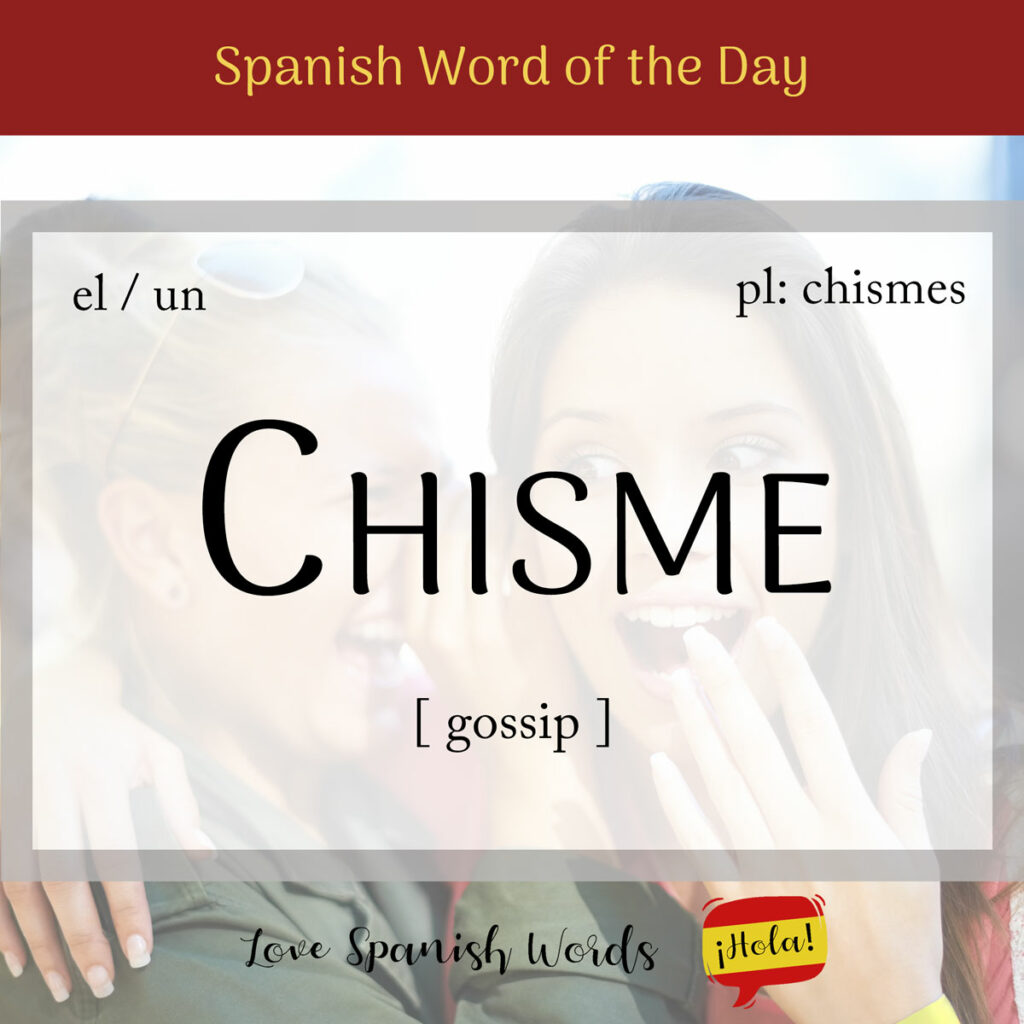The word chisme is thought to have derived from the Latin word cimex, meaning bug, but it may also come from the Latin word schisma meaning division.
In English, it translates to gossip. However, in Spanish, the word carries a much broader meaning than just the negative connotation associated with gossip and rumours in English.
This word is integral to Latino culture, serving as a cornerstone in many Latino households. It encompasses a wide range of meanings, including rumours, harmless anecdotes, detailed stories, community news, and even the act of going to places simply to observe and gather conversation topics. Let’s delve into it further below.
Latin American Pronunciation
European Pronunciation

Chisme is a masculine noun that means gossip in English. It takes the following definite and indefinite articles:
- el chisme = the gossip
- un chisme = a gossip
- los chismes = the gossip (sometimes expressed as ‘gossips’)
- unos chismes = some gossip
Mi amiga sabe todo el chisme de la oficina.
My friend knows all the office gossip.
Chisme is akin to a national pastime, where being “nosy” and gossiping about anything and everything has become normalised and accepted! It serves as a form of entertainment shared among friends, family, and even strangers.
Latinos relish in conversations at gatherings, whether it’s at parties, nail salons, or family cookouts, where they eagerly swap stories about family dramas, recent events like births or weddings, neighborhood gossip, and more.
Unlike English gossip, chisme isn’t solely about trash-talking; it’s about building connections and relationships through conversation. It’s a way to stave off boredom and get to know someone better, often through storytelling.
In many ways, chisme serves as a form of bonding, bringing families, friends, and even strangers closer together by inviting them into the conversation and making them feel warm and welcomed.

Now that you have an understanding of the diverse meanings of chisme, let’s explore some descriptive words commonly used alongside it:
- chisme jugoso = juicy gossip
- chisme bueno = good gossip
- chisme malo = bad gossip
- chisme del dia = gossip of the day
- chisme del pueblo = town gossip
Mi amiga me contó un chisme jugoso.
My friend told me some juicy gossip.

Chisme also goes by various local names. In Peru, it’s called rajé, in Puerto Rico, bochinche, in Colombia, cotorreo, in Spain, cotilleo, in Mexico, comadreo, in Guatemala, chambre, in Ecuador, bolas, and in Chile, cahuín!
Chisme can function as a noun, verb, or adjective. El chisme (the gossip) serves as the noun, chismear (to gossip) acts as the verb, and chismoso/a (gossipy) serves as the adjective. Let’s delve into how they’re used.
Chisme as a noun:
- iDeberíamos vernos! Necesito contarte un chisme! (We should see each other! I have some gossip to tell you.)
- Te tengo un chisme jugoso. (I have some juicy gossip for you.)
- Mi amiga me conto un chisme de su prima. (My friend told me some gossip about her cousin.)
Chisme as a verb:
- ¿Quieres ir por un cafecito para chismear? (Do you want to go for a coffee to gossip).
- Estuve chismeando todo el día en el trabajo. (I was gossipping at work all day.)
- Mi amiga y yo chismeamos toda la noche. (My friend and I gossiped all night.)
Chisme as an adjective:
- En mi pueblo hay muchos chismosos. (My town has a lot of nosy people / gossipers.)
- Maria es la chismosa del pueblo. (Maria is the town gossiper.)
- En mi barrio hay mucha gente chismosa. (In my neighbourhood there are a lot of nosy people / gossipers.)
- Tengo muchas tías chismosas. (I have a lot of nosy / gossipy aunts.)
As mentioned earlier, the direct translation of chisme is gossip, typically of the malicious kind where something is said behind someone’s back without their knowledge. This type of gossip is often associated with dislike towards someone and the spreading of rumors.
Me enteré que la señora anda contando chismes de mi.
I found out the lady is spreading rumours / gossip about me.
Then we have the chisme that refers to the “let-me-tell-you-everything-that-happened-at-the-party” type of gossip. This form of gossip involves sharing all the details about what occurred at the party, including both the highlights and any negative events. It’s essentially storytelling that includes both good and bad gossip.
It can also refer to getting together with someone to share everything that’s been going on in your life. For instance, getting together with your sisters to chismear (to gossip) means sharing your lives or discussing everything that’s happened in the last week or month. It can also involve situations where an Uber driver or nail technician asks you absolutely everything about your life.

In many Latin American countries such as Mexico and Colombia, it’s normal for locals to ask a lot of questions that may seem intrusive, such as who you live with, whether you are married or have a boyfriend or girlfriend, why you divorced, how much you pay for something, etc. The interrogation may feel odd if you aren’t used to it. However, Latinos will ask a lot of questions to genuinely show interest, to help you, and to welcome you. We call this interrogation being a chismoso (nosy), but it’s not seen as a bad thing.
iCuéntame todo el chisme de la fiesta! ¿iQué pasó!?
Tell me all the party gossip! What happened?
There is also the type of chisme that’s a personal story about yourself that you share with a friend. For example, you call her about how you saw your ex and want to share everything that happened. The focus is on yourself, not necessarily on talking negatively about the ex or anyone else.
Te tengo un chisme. iAyer, vi a mi ex! iNo vas a creer lo que paso!
I have gossip for you! Yesterday I saw my ex! You won’t believe what happened!
Another type of chisme is the one that involves seeing or observing. For instance, if you want to head to the mall to see what’s going on, you can say Vamos al centro comercial a ver que chismeamos (Let’s go to the mall and see what’s happening). This implies not just observing things for purchase but also anticipating any interesting or exciting events that might occur while there.
In addition, chisme can refer to simply being in the know about everything! For example, Me sé todo el chisme translates to I know all the gossip. This can encompass knowing everything about a celebrity, a person, an event, or anything one learns. Usually, it’s associated with finding out through social media or news outlets on TV, but it can also refer to knowing everything going on at work or in the office. A person who knows everything is referred to as a chismoso, which translates to gossiper but more closely relates to being nosy or knowing it all.
Me enteré del chisme acerca de Shakira a través de Tiktok!
I found out all the gossip about Shakira through TikTok!

Colloquial and figurative phrases featuring ‘chisme‘
The word chisme is mostly associated with casual conversation, but because it can sometimes carry negative connotations, there are figurative phrases related to it. Let’s explore some of these.
In Spain, chisme is used to refer to an unimportant or insignificant object. Its closest English equivalents would be thingies, thingamajig, or trinket.
Chisme de vecindad or chisme de barrio refers to neighbourhood rumours or gossip, which are often false.
Chisme de lavadero, or laundry gossip, describes gossip that is filthy or tacky. It’s the type of gossip that probably shouldn’t be spread because it’s hurtful or scandalous.
La reina/rey del chisme translates to the queen/king of gossip. It refers to someone who seems to know absolutely everything all the time.
Idiomatic expressions featuring ‘chisme’
Desparramar chismes
Literal translation: to spill/spread gossip
English meaning: to spread gossip all over the place
Soltar el chisme
Literal translation: to let gossip lose
English meaning: to spill the beans
Echar un chisme
Literal translation: to throw a gossip
English meaning: to gossip
Many of us Latinos are chismosos (though not all, of course—I don’t want to generalise too much), and we take pride in making you feel welcomed by listening to your stories and learning about where you come from. We enjoy knowing everything and sharing our own stories.
When you visit a Latin American country, don’t be surprised if you’re bombarded with questions about your life at a local family gathering or in someone’s home. It’s completely normal and just our way of showing warmth and interest in you.
So, instead of feeling put on the spot, join in on the chisme and ask the locals about their lives as well! Trust me, they’ll be more than happy to share all the details with you!

